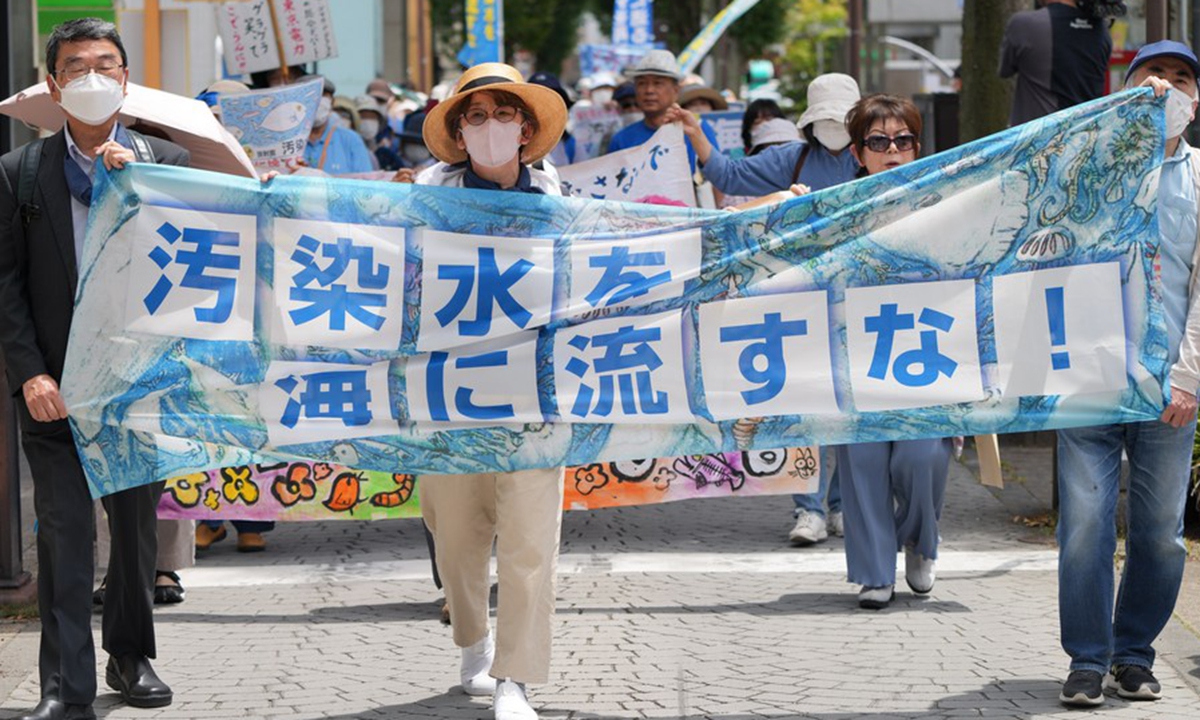Japanese people rally against planned release of Fukushima nuclear-contaminated water into sea

People protest against the Japanese government's plan to discharge nuclear-contaminated water into the sea in Fukushima, Japan, June 20, 2023. (Xinhua/Zhang Xiaoyu)
Nearly 100 Japanese people rallied on Tuesday outside the Fukushima Prefectural Government Office to voice their strong opposition to the latter's stance on discharging radioactive wastewater from the crippled Fukushima Daiichi nuclear power plant into the Pacific Ocean.
"The mountains and rivers will never return to the past, and the radiation will not disappear easily. But compared to life and love, this country puts making money first!" Tatsuko Okawara from Tamura city, Fukushima Prefecture, shouted a line from a puppet show she created, exposing the inside story of the Japanese government's eagerness to dump nuclear-contaminated water into the sea.
Tokyo Electric Power Company (TEPCO), the plant's operator, began trialing the equipment for discharging the nuclear-contaminated water into the Pacific on June 12. The test run of the discharge facility is expected to finish on June 26. The nuclear wastewater release led by the Japanese government seems to have entered the countdown.
Around Tuesday noon, people from all over Japan who are opposed to the dumping plan gathered in a "Fukushima Action," staging parades, rallies and petitions, to express their firm opposition to the stance of the Fukushima prefectural government on the issue.
Chiyo Oda, an organizer of the event and the co-representative of the civic group "Stop Polluting the Sea", told Xinhua, "The government says every day that the trial operation will end soon, making everyone feel that the ocean discharge is an established fact, and wants us to give up."
"But it is wrong to discharge nuclear-contaminated water into the sea, and there are still places for the water storage tanks, so it has not reached the point where it must be discharged," Oda said.
Masuko Eiichi from the prefecture's Koriyama city, also criticized the discharge plan at the gathering, saying, "These storage tanks for nuclear-contaminated water can be stored for a long time as long as the government and TEPCO want to. But they have chosen the cheapest way to deal with them by discharging the wastewater into the sea."
Regarding the government referring the diluted nuclear-contaminated water as "treated water," Sakurai from Niigata Prefecture said it is a fraud to confuse the public.
Eiichi explained that nuclear-contaminated water can be diluted, but the total amount of nuclear pollutants discharged remains unchanged.
"Moreover, there are not only the radioactive element tritium in the water, but also 57 kinds of radioactive substances such as cesium and strontium that cannot be removed," Eiichi added.
In the petition to be submitted to the Fukushima prefectural government, the participants voiced more demands and concerns.
They said, "In the absence of quantitative determination of all radioactive substances in the contaminated water, discharging the water into the sea will cause a large amount of radioactive substances to spread to the entire Pacific Ocean through the coastal waters of Fukushima, and then pollute the global marine environment..."
Under the scorching sun, Okawara's speech continued, "Nuclear-contaminated water must not be discharged into the sea. It is a crime, a crime against all living things on earth!"
